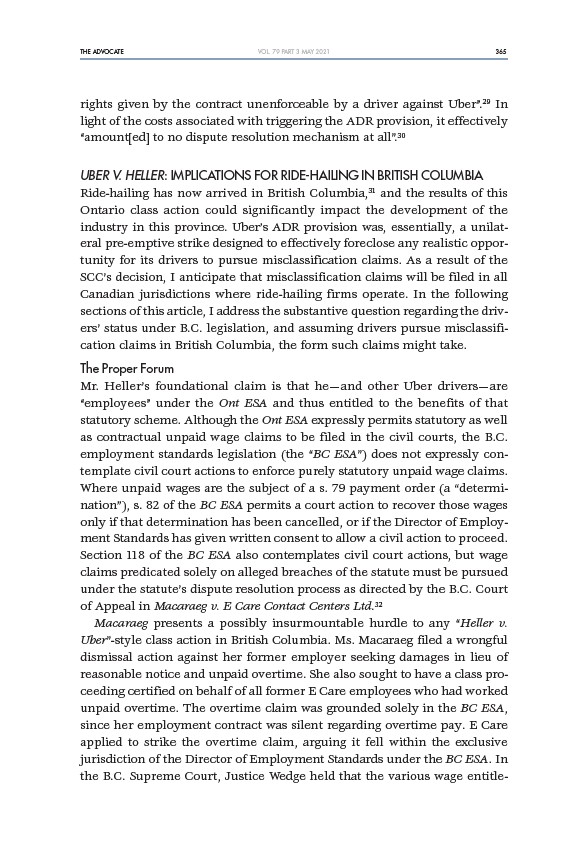
THE ADVOCATE 365
VOL. 79 PART 3 MAY 2021
rights given by the contract unenforceable by a driver against Uber”.29 In
light of the costs associated with triggering the ADR provision, it effectively
“amounted to no dispute resolution mechanism at all”.30
UBER V. HELLER: IMPLICATIONS FOR RIDE-HAILING IN BRITISH COLUMBIA
Ride-hailing has now arrived in British Columbia,31 and the results of this
Ontario class action could significantly impact the development of the
industry in this province. Uber’s ADR provision was, essentially, a unilateral
pre-emptive strike designed to effectively foreclose any realistic opportunity
for its drivers to pursue misclassification claims. As a result of the
SCC’s decision, I anticipate that misclassification claims will be filed in all
Canadian jurisdictions where ride-hailing firms operate. In the following
sections of this article, I address the substantive question regarding the drivers’
status under B.C. legislation, and assuming drivers pursue misclassification
claims in British Columbia, the form such claims might take.
The Proper Forum
Mr. Heller’s foundational claim is that he—and other Uber drivers—are
“employees” under the Ont ESA and thus entitled to the benefits of that
statutory scheme. Although the Ont ESA expressly permits statutory as well
as contractual unpaid wage claims to be filed in the civil courts, the B.C.
employment standards legislation (the “BC ESA”) does not expressly contemplate
civil court actions to enforce purely statutory unpaid wage claims.
Where unpaid wages are the subject of a s. 79 payment order (a “determination”),
s. 82 of the BC ESA permits a court action to recover those wages
only if that determination has been cancelled, or if the Director of Employment
Standards has given written consent to allow a civil action to proceed.
Section 118 of the BC ESA also contemplates civil court actions, but wage
claims predicated solely on alleged breaches of the statute must be pursued
under the statute’s dispute resolution process as directed by the B.C. Court
of Appeal in Macaraeg v. E Care Contact Centers Ltd.32
Macaraeg presents a possibly insurmountable hurdle to any “Heller v.
Uber”-style class action in British Columbia. Ms. Macaraeg filed a wrongful
dismissal action against her former employer seeking damages in lieu of
reasonable notice and unpaid overtime. She also sought to have a class proceeding
certified on behalf of all former E Care employees who had worked
unpaid overtime. The overtime claim was grounded solely in the BC ESA,
since her employment contract was silent regarding overtime pay. E Care
applied to strike the overtime claim, arguing it fell within the exclusive
jurisdiction of the Director of Employment Standards under the BC ESA. In
the B.C. Supreme Court, Justice Wedge held that the various wage entitle-